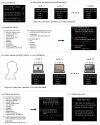Discovering the psychological building blocks underlying climate action-a longitudinal study of real-world activism
- PMID: 35706661
- PMCID: PMC9156928
- DOI: 10.1098/rsos.210006
Discovering the psychological building blocks underlying climate action-a longitudinal study of real-world activism
Abstract
We are in a climate emergency. Because governments are reacting too slowly, grassroots collective action is key. Understanding the psychological factors underpinning engagement can facilitate the growth of such collective action. Yet, previous research in psychology rarely provided causal evidence for which factors trigger action, lacked focus on the climate crisis, was mostly self-reported behaviour or intentions rather than objective measures, and was mostly cross-sectional rather than longitudinal. Here we conducted a longitudinal study on the effectiveness of a 12-week video intervention designed to increase psychological predictors of collective action. The intervention boosted affective engagement, collective efficacy, and self-efficacy, but did not increase observed attendance of activism events. Interviews suggested that Zoom fatigue and the online study design undercut the social interaction participants wanted in order to join events. However, a smaller in-person replication did not increase activism either. Debriefings suggested that the replication participants were primarily motivated by payment and lacked time or resources for more engagement. These results highlight the crucial importance of going beyond measures of self-reported attitudes or intentions to objectively measuring activism behaviours and showing the difficulty of fostering event attendance.
Keywords: activism; climate change; collective action; pro-environmental behaviour; prosocial behaviour.
© 2022 The Authors.
Figures


References
-
- Change, I. P. on C. 2018. Global Warming of 1.5°C: An IPCC Special Report on the Impacts of Global Warming of 1.5°C Above Pre-industrial Levels and Related Global Greenhouse Gas Emission Pathways, in the Context of Strengthening the Global Response to the Threat of Climate Chang. Intergovernmental Panel on Climate Change.
-
- Vetesse T. 2018. Climate Gut check. Boston: Review. See Http://bostonreview.net/science-nature/troy-vettese-climate-gut-check.
-
- Mildenberger M. 2020. Carbon captured: How business and labor control climate politics. Cambridge, MA: MIT Press.
Associated data
LinkOut - more resources
Full Text Sources
